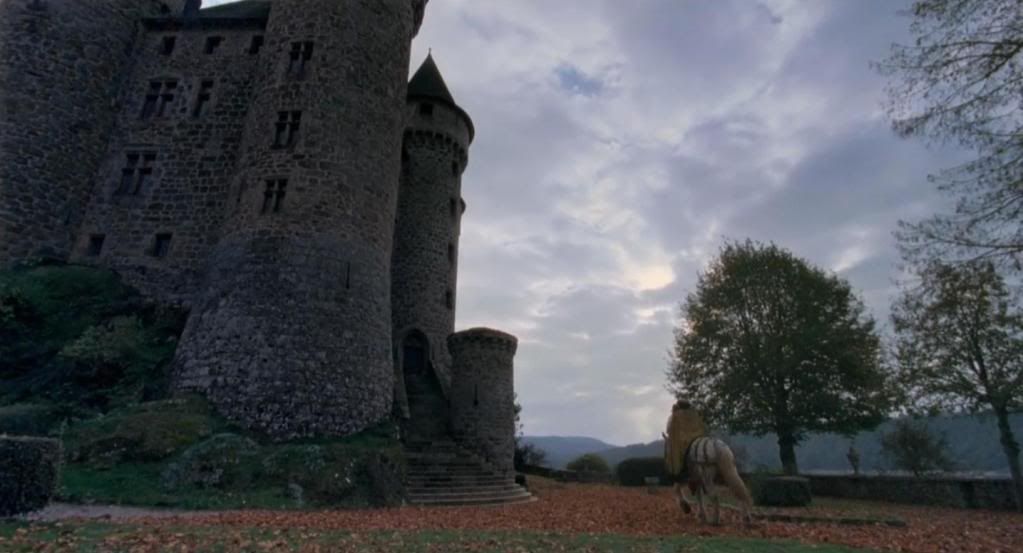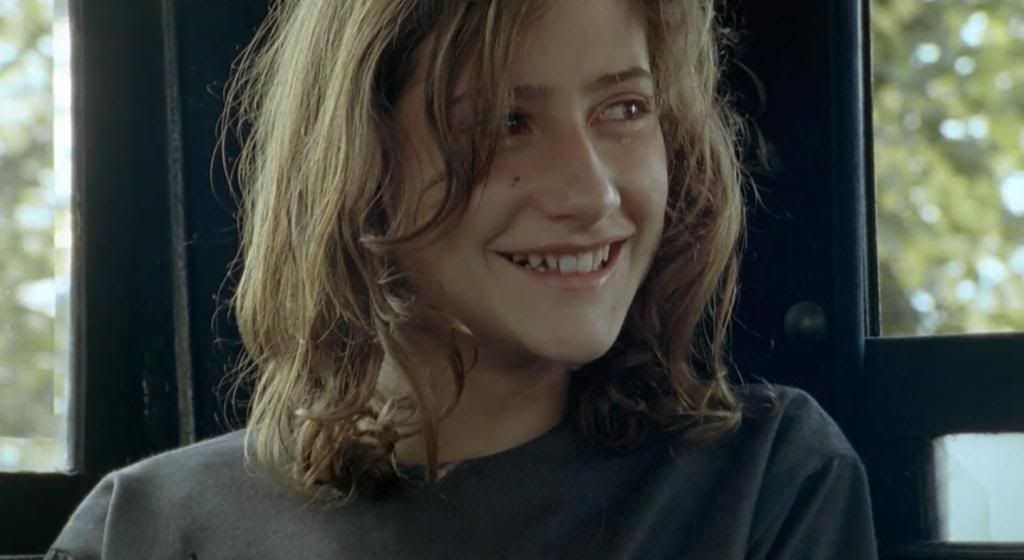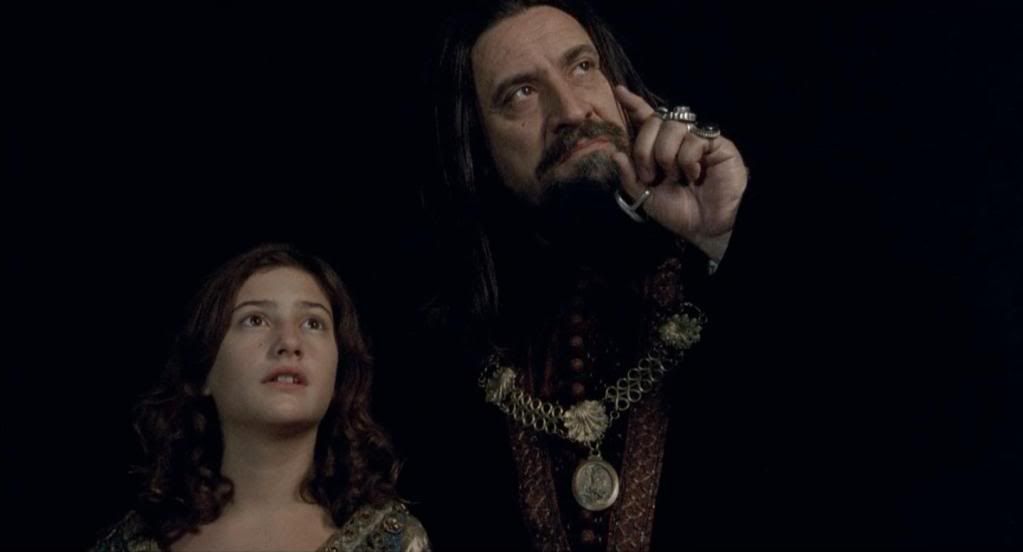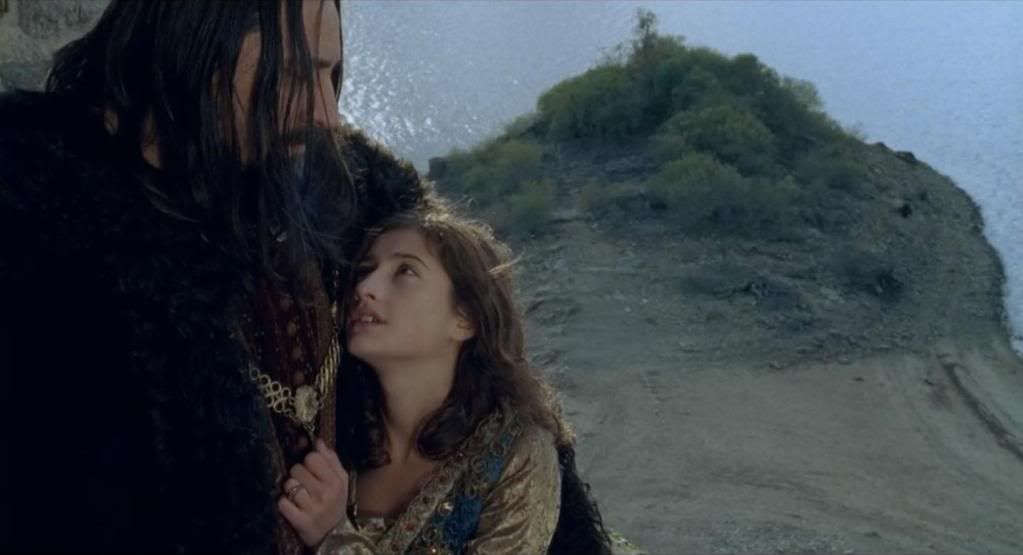
Catherine Breillat's films have often been concerned with childhood and innocence, especially the loss of girlish innocence, often with the implied or explicit double meaning of the loss of virginity. Her take on the classic tale of Bluebeard is one of her most direct and fascinating inquiries into childhood and the ways in which societal ideas about love, sex and marriage are passed on to young girls. The film operates on two levels, constantly switching back and forth between two parallel stories. In one, two little girls (Marilou Lopes-Benites and Lola Giovannetti) — the younger one named Catherine, suggesting an autobiographical stand-in for the director — play in the attic and read the story of Bluebeard, with the younger one relishing her older sister's fear of the story's gruesome details and violence. This material alternates with a sensual, visually beautiful adaptation of Charles Perrault's Bluebeard itself, with the titular great lord (Dominique Thomas) taking his newest child-bride, Marie-Catherine (Lola Créton) into his castle.
The alternation of the two stories suggests that the Bluebeard legend is part of the mythology by which young girls learn about adulthood. The other story mentioned by the girls, who intersperse their readings from the book with playful chatter about marriage and other matters, is The Little Mermaid, and together these two stories represent the two extremes of girlish indoctrination into love and sexuality: on the one hand, the swooning, tragic romanticism of a girl willing to give up everything for her great love, and on the other hand a girl terrified of her man, terrified, subtextually, of the violence represented by sex. The girls talk a great deal about love and marriage, but it's clear that they really understand nothing, they're too young, they've picked up bits and pieces out of context but much of what they've learned is myth and legend, filling them with equal parts unrealistic romanticism and uncomprehending terror.

Within both stories here, it's the younger of two sisters who is bolder and stronger. Just as Catherine lacks her older sister's fear, Marie-Catherine doesn't tremble before Bluebeard like her older sister Anne (Daphné Baiwir) or the other girls, but is actually strangely drawn to him. Indeed, Breillat's Bluebeard isn't a terrifying figure so much as a tragic one, a sad and withdrawn mountain of a man, looking especially tremendous next to his tiny child bride, who looks up at him with wide eyes and a mischievous smile, and is unafraid to assert her own way when she moves into his castle. There's a class component to their relationship: Marie-Catherine and Anne had lost their father and been left to poverty, and Bluebeard's marriage proposal is a form of rescue, one that the irrepressible Marie-Catherine, who refuses to feel sorry for herself, eagerly leaps at. She revels in her lavish new home and her freedom, setting aside a tiny room for herself, a room so small that her massive husband cannot even enter — the sexual symbolism is unmissable and delivered with winking bravado.
And yet Marie-Catherine finds herself liking this seemingly gentle giant who towers over her, dwarfing her tiny form, looking at her with kindness and admiration and more than a little incomprehension. In other words, he's a typical man, baffled and intrigued and amused by the ways of women. He's also something of a god for her, a subtext that's made strikingly clear in the test he sets for her, giving her a key to a basement room and then forbidding her from entering it; it's as though she's Eve in Eden, being tested by God, ordered not to eat from the readily accessible tree of knowledge. Breillat seems to be suggesting that the Bluebeard tale, far from being a mere gory fable of male violence, is a reflection of all marriages, all of them repeating this paternalist power struggle that originated with the relationship between God and Eve. This tragic Bluebeard is just as trapped by expectations and roles as his young wife, forced to repeat a violent ritual over and over again rather than break free of the cycle.
This theme of repetition is realized formally in the scene where Bluebeard traps Marie-Catherine in a tower but must ascend and descend several times as she tricks him with delaying tactics. Breillat repeats the same image of Bluebeard going up or down the stairs several times in succession, conveying the impression that there are far more steps than there actually are, and enforcing the sense of being trapped by a cycle, forced to mechanically repeat the same actions and embody the same stereotypes over and over again. With this in mind, the curiously ambiguous final image becomes, not a victory, but a simple reversal of the cycle, the violence of this relationship reconfigured but not eliminated.

Religious hypocrisy plays a big part in perpetuating the helplessness of women and the dominance of men in this film. Towards the beginning of the film, Marie-Catherine and Anne are housed in a religious school where they're dressed in form-erasing robes and nun-like habits, until the girls are told that their father has died. The Mother Superior tells them not to be sad, not to grieve, but to rejoice: "He is in the Kingdom of Heaven," she says, and Breillat immediately cuts to a shot of the girls, shocked and upset, their faces wet with tears, not the least comforted by these empty words. The irony is then made even more bitter by the nun's announcement that the girls must leave: "this is a private college, not, alas, a charity." This woman is pious and unworldly when it comes to grief, suggesting that the girls think abstractly of Heaven rather than deal with the actual physical death of their father, but she then becomes coolly businesslike because the girls' family can no longer afford their tuition.
Breillat is depicting a societal structure that seems stacked against women in every way. After their father's death, the girls and their mother are left to poverty, their possessions taken away to pay off debts. They're totally abandoned and cast out, and the girls' mother tells them that their only hope is the convent, since they have no means and no one will want to marry a girl without a dowry. Anne reacts badly, getting angry at her father for dying and her mother for dressing them in mourning black, but the younger, tougher Marie-Catherine more appropriately strikes out at the representatives of the societal forces that are essentially punishing these women for losing their man. Marie-Catherine vows to strangle the compassionless Mother Superior and shouts curses at the men who dispassionately remove the family's possessions from their home; she understands that it's not the fault of her father or mother, but of the societal rules that govern their opportunities. She understands that justice is for the rich, not the poor, so she simply vows to be rich.

It seems that starting with The Last Mistress, Breillat has become a much more complex filmmaker than ever before, discarding the porny provocations and didactic tone of much of her earlier work in favor of rich layers of subtext and suggestion. Her Bluebeard is concise, not even an hour and a half long, but it's packed with elegant intimations of multiple deeper meanings. Her images have a fairy tale's beauty, capturing the looming majesty of Bluebeard's castle, the sumptuousness of the elegant clothes and jewels, the lush greenery and rocky shores of the surrounding countryside.
Breillat is also very sensitive to the nuances of the actors' performances, inching in for astonishing frame-filling closeups in which every twitching smile, every sisterly eye-roll or naïve stare, is sublimely rendered. Breillat seems particularly bewitched by the young actresses playing the two younger sisters, and Créton especially has a distinctive, mischievous face that perfectly conveys the mix of fragility and self-assurance in this young girl. Ravishingly beautiful, infused with melancholy and metatextual playfulness, Breillat's Bluebeard is one of the director's finest films, a work of great density and emotion that provokes far more thought than the director's more overtly provocative earlier films.

2 comments:
I will confess Ed, that I like the film less than you, but I acknowledged it's ravishing visual trappings and still-fascinating if underdeveloped themes. Like you I think Ms. Breillat is a formidable talent, and her THE LAST MISTRESS was one of my three favorite films of it's release year. It seems to me that is this film there was a concentration on the first half of the Bluebeard story, which unfortunately left of the the most intriguing possibilities off the table. But regardless, no Breillat film is devoid of visual splendor, humorous underpinnings and the themes (religious hypocricy, the dominance of men, and the subservience of women) with your usual penchant for description and cerebral exuberance. I saw this in the theatre, but would like at some point to see it again on DVD. I have too much respect for Breillat not to give this another go.
Sam, I think the focus on the early parts of the Bluebeard tale - and the early parts of a marriage - is what makes the film so strong, since it places the emphasis not on the violence of Bluebeard's killings, but on the fear and anxiety and uneasy attraction of their relationship. The killing element is almost an afterthought; what Breillat is really interested in here is the dynamic of control, fear and desire that exists between Bluebeard and his young new wife.
I think this and the subsequent The Sleeping Beauty (which I'll have a post about tomorrow) are Breillat's strongest films. I also quite liked The Last Mistress, like you, but I'm ambivalent about much of what I've seen from earlier in her career. She's a fascinating filmmaker though, that's for sure.
Post a Comment